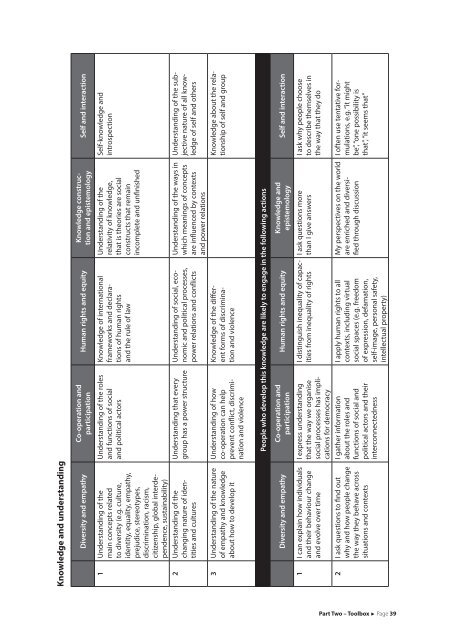TASKs for democracy
4NYw4W
4NYw4W
You also want an ePaper? Increase the reach of your titles
YUMPU automatically turns print PDFs into web optimized ePapers that Google loves.
Knowledge and understanding<br />
Diversity and empathy<br />
1 Understanding of the<br />
main concepts related<br />
to diversity (e.g. culture,<br />
identity, equality, empathy,<br />
prejudice, stereotypes,<br />
discrimination, racism,<br />
citizenship, global interdependence,<br />
sustainability)<br />
2 Understanding of the<br />
changing nature of identities<br />
and cultures<br />
3 Understanding of the nature<br />
of empathy and knowledge<br />
about how to develop it<br />
Diversity and empathy<br />
1 I can explain how individuals<br />
and their behaviour change<br />
and evolve over time<br />
2 I ask questions to find out<br />
why and how people change<br />
the way they behave across<br />
situations and contexts<br />
Co-operation and<br />
participation<br />
Understanding of the roles<br />
and functions of social<br />
and political actors<br />
Human rights and equity<br />
Knowledge of international<br />
frameworks and declarations<br />
of human rights<br />
and the rule of law<br />
Knowledge construction<br />
and epistemology<br />
Understanding of the<br />
relativity of knowledge,<br />
that is theories are social<br />
constructs that remain<br />
incomplete and unfinished<br />
Understanding that every<br />
group has a power structure<br />
Understanding of how<br />
co-operation can help<br />
prevent conflict, discrimination<br />
and violence<br />
Understanding of social, economic<br />
and political processes,<br />
power relations and conflicts<br />
Knowledge of the different<br />
<strong>for</strong>ms of discrimination<br />
and violence<br />
Understanding of the ways in<br />
which meanings of concepts<br />
are influenced by contexts<br />
and power relations<br />
People who develop this knowledge are likely to engage in the following actions<br />
Co-operation and<br />
participation<br />
I express understanding<br />
that the way we organise<br />
social processes has implications<br />
<strong>for</strong> <strong>democracy</strong><br />
I gather in<strong>for</strong>mation<br />
about the roles and<br />
functions of social and<br />
political actors and their<br />
interconnectedness<br />
Human rights and equity<br />
I distinguish inequality of capacities<br />
from inequality of rights<br />
I apply human rights to all<br />
contexts, including virtual<br />
social spaces (e.g. freedom<br />
of expression, defamation,<br />
self-image, personal safety,<br />
intellectual property)<br />
Knowledge and<br />
epistemology<br />
I ask questions more<br />
than I give answers<br />
My perspectives on the world<br />
are enriched and diversified<br />
through discussion<br />
Self and interaction<br />
Self-knowledge and<br />
introspection<br />
Understanding of the subjective<br />
nature of all knowledge<br />
of self and others<br />
Knowledge about the relationship<br />
of self and group<br />
Self and interaction<br />
I ask why people choose<br />
to describe themselves in<br />
the way that they do<br />
I often use tentative <strong>for</strong>mulations,<br />
e.g. “it might<br />
be”, “one possibility is<br />
that”, “it seems that”<br />
Part Two – Toolbox Page 39


